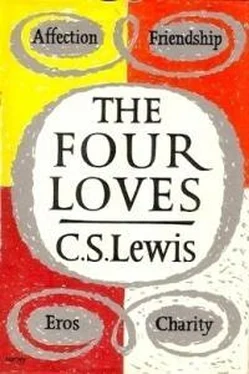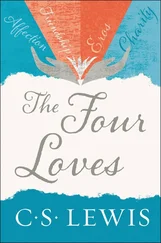At the cliff's top we are near the village, but however long we sit there we shall never be any nearer to our bath and our tea. So here the likeness, and in that sense nearness, to Himself which God has conferred upon certain creatures and certain states of those creatures is something finished, built in. What is near Him by likeness is never, by that fact alone, going to be any nearer. But nearness of approach is, by definition, increasing nearness. And whereas the likeness is given to us—and can be received with or without thanks, can be used or abused—the approach, however initiated and supported by Grace, is something we must do. Creatures are made in their varying ways images of God without their own collaboration or even consent. It is not so that they become sons of God. And the likeness they receive by sonship is not that of images or portraits. It is in one way more than likeness, for it is unison or unity with God in will; but this is consistent with all the differences we have been considering. Hence, as a better writer has said, our imitation of God in this life—that is, our willed imitation as distinct from any of the likenesses which He has impressed upon our natures or states—must be an imitation of God incarnate: our model is the Jesus, not only of Calvary, but of the workshop, the roads, the crowds, the clamorous demands and surly oppositions, the lack of all peace and privacy, the interruptions. For this, so strangely unlike anything we can attribute to the Divine life in itself, is apparently not only like, but is, the Divine life operating under human conditions.
I must now explain why I have found this distinction necessary to any treatment of our loves. St. John's saying that God is love has long been balanced in my mind against the remark of a modern author (M. Denis de Rougemont) that "love ceases to be a demon only when he ceases to be a god"; which of course can be re–stated in the form "begins to be a demon the moment he begins to be a god". This balance seems to me an indispensable safeguard. If we ignore it the truth that God is love may slyly come to mean for us the converse, that love is God.
I suppose that everyone who has thought about the matter will see what M. de Rougemont meant. Every human love, at its height, has a tendency to claim for itself a divine authority. Its voice tends to sound as if it were the will of God Himself. It tells us not to count the cost, it demands of us a total commitment, it attempts to over–ride all other claims and insinuates that any action which is sincerely done "for love's sake" is thereby lawful and even meritorious. That erotic love and love of one's country may thus attempt to "become gods" is generally recognised. But family affection may do the same. So, in a different way, may friendship. I shall not here elaborate the point, for it will meet us again and again in later chapters.
Now it must be noticed that the natural loves make this blasphemous claim not when they are in their worst, but when they are in their best, natural condition; when they are what our grandfathers called "pure" or "noble". This is especially obvious in the erotic sphere. A faithful and genuinely self–sacrificing passion will speak to us with what seems the voice of God. Merely animal or frivolous lust will not. It will corrupt its addict in a dozen ways, but not in that way; a man may act upon such feelings but he cannot revere them any more than a man who scratches reveres the itch. A silly woman's temporary indulgence, which is really self–indulgence, to a spoiled child—her living doll while the fit lasts—is much less likely to "become a god" than the deep, narrow devotion of a woman who (quite really) "lives for her son". And I am inclined to think that the sort of love for a man's country which is worked up by beer and brass bands will not lead him to do much harm (or much good) for her sake. It will probably be fully discharged by ordering another drink and joining in the chorus.
And this of course is what we ought to expect. Our loves do not make their claim to divinity until the claim becomes plausible. It does not become plausible until there is in them a real resemblance to God, to Love Himself. Let us here make no mistake. Our Gift–loves are really God–like; and among our Gift–loves those are most God–like which are most boundless and unwearied in giving. All the things the poets say about them are true. Their joy, their energy, their patience, their readiness to forgive, their desire for the good of the beloved—all this is a real and all but adorable image of the Divine life. In its presence we are right to thank God "who has given such power to men". We may say, quite truly and in an intelligible sense, that those who love greatly are "near" to God. But of course it is "nearness by likeness". It will not of itself produce "nearness of approach". The likeness has been given us. It has no necessary connection with that slow and painful approach which must be our own (though by no means our unaided) task. Meanwhile, however, the likeness is a splendour. That is why we may mistake Like for Same. We may give our human loves the unconditional allegiance which we owe only to God. Then they become gods: then they become demons. Then they will destroy us, and also destroy themselves. For natural loves that are allowed to become gods do not remain loves. They are still called so, but can become in fact complicated forms of hatred.
Our Need–loves may be greedy and exacting but they do not set up to be gods. They are not near enough (by likeness) to God to attempt that.
It follows from what has been said that we must join neither the idolaters nor the "debunkers" of human love. Idolatry both of erotic love and of "the domestic affections" was the great error of Nineteenth Century literature. Browning, Kingsley, and Patmore sometimes talk as if they thought that falling in love was the same thing as sanctification; the novelists habitually oppose to "the World" not the Kingdom of Heaven but the home. We live in the reaction against this. The debunkers stigmatise as slush and sentimentality a very great deal of what their fathers said in praise of love. They are always pulling up and exposing the grubby roots of our natural loves. But I take it we must listen neither "to the over–wise nor to the over–foolish giant". The highest does not stand without the lowest. A plant must have roots below as well as sunlight above and roots must be grubby. Much of the grubbiness is clean dirt if only you will leave it in the garden and not keep on sprinkling it over the library table. The human loves can be glorious images of Divine love. No less than that: but also no more—proximities of likeness which in one instance may help, and in another may hinder, proximity of approach. Sometimes perhaps they have not very much to do with it either way.
Chapter II
Likings and Loves for the Sub-human
Most of my generation were reproved as children for saying that we "loved" strawberries, and some people take a pride in the fact that English has the two verbs love and like while French has to get on with aimer for both. But French has a good many other languages on its side. Indeed it very often has actual English usage on its side too. Nearly all speakers, however pedantic or however pious, talk every day about "loving" a food, a game, or a pursuit. And in fact there is a continuity between our elementary likings for things and our loves for people. Since "the highest does not stand without the lowest" we had better begin at the bottom, with mere likings; and since to "like" anything means to take some sort of pleasure in it, we must begin with pleasure.
Now it is a very old discovery that pleasures can be divided into two classes; those which would not be pleasures at all unless they were preceded by desire, and those which are pleasures in their own right and need no such preparation. An example of the first would be a drink of water. This is a pleasure if you are thirsty and a great one if you are very thirsty. But probably no one in the world, except in obedience to thirst or to a doctor's orders, ever poured himself out a glass of water and drank it just for the fun of the thing. An example of the other class would be the unsought and unexpected pleasures of smell—the breath from a bean–field or a row of sweet–peas meeting you on your morning walk. You were in want of nothing, completely contented, before it; the pleasure, which may be very great, is an unsolicited, super–added gift. I am taking very simple instances for clarity's sake, and of course there are many complications. If you are given coffee or beer where you expected (and would have been satisfied with) water, then of course you get a pleasure of the first kind (allaying of thirst) and one of the second (a nice taste) at the same time. Again, an addiction may turn what was once a pleasure of the second kind into one of the first. For the temperate man an occasional glass of wine is a treat—like the smell of the bean–field. But to the alcoholic, whose palate and digestion have long since been destroyed, no liquor gives any pleasure except that of relief from an unbearable craving. So far as he can still discern tastes at all, he rather dislikes it; but it is better than the misery of remaining sober. Yet through all their permutations and combinations the distinction between the two classes remains tolerably clear. We may call them Need–pleasures and Pleasures of Appreciation.
Читать дальше











